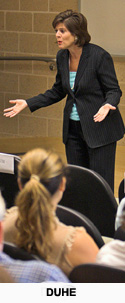 |
 |
 |
|
|
|
|
|
|
|
|
|
|
|
|
|
|
|
|
|
|
|
|
|
|
|
|
|
|
|
|
|
|
|
|
|
The discussion forum which served to examine the Katrina issues was a feature of the school’s 2006 Graduate Student Orientation and Academic Seminar held on August 22nd in the new $25 million Public Health Research Center on Assembly Street. In introducing the seminar, Arnold School Dean Donna Richter said that Hurricane Katrina, along with the 9/11 attacks and the subsequent anthrax scare, are among key events that have changed the profile and spotlighted the role of public health. Perhaps the most significant outcome of these events is today’s emphasis on public health preparedness. Whatever the reason, “public health could not be a hotter field than it is right now,” Richter said. Dean Richter expressed her belief that the approaching first anniversary of Hurricane Katrina provides a poignant opportunity to inventory the many public health implications of that disaster. The keynote speaker for the Katrina-focused portion of the program was Dr. Sonya Duhé, an associate professor in the School of Journalism and Mass Communications and a Louisiana native. In her remarks Dr. Duhé, emphasized her passion in promoting the University’s response in the wake of Katrina, and she underscored the sense that she and other researchers at USC had for the urgency to study the effects of this historic storm. In just a matter of weeks after the storm hit, USC's Office of Research and Health Sciences made nearly $400,000 available through a program it called Coastal Resiliency Information Systems Initiative for the Southeast or CRISIS. This initiative funded 18 studies across both the basic and social sciences, the results of which were made public in April at a national summit held in Columbia. The USC projects focused not only on the environmental and societal impact of Katrina but were also designed “to better prepare for the next Katrina,” said Duhé. Among the studies that were conducted as a part of the CRISIS initiative, numerous projects addressed public health concerns. Dr. Sarah Laditka, an associate professor in the Department of Health Services Policy and Management, said her post-Katrina investigations focused on the plight of “older, feeble people in nursing homes,” most in the coastal area of Mississippi. Laditka said her interviews with the nursing home administrators and staff revealed a wide array of emotions and experiences. Nursing home administrators “welcomed us with open arms…and said nobody else had listened to them.” Laditka said she was impressed with the dedication of the caregivers working in the Mississippi nursing homes who “were willing to put the well-being of the residents ahead of their own well- being.” Katrina victims who did not evacuate in advance of the storm were the focus of research by Dr. Sudha Xirasagar, a research assistant professor in the Department of Health Services Policy and Management. She said a complex set of reasons, including the lack of money, transportation, fear of crime and violence and the need to care for ailing relatives, led people to decide to ride out the storm. Xirasagar said recommendations for public policy planners based on the research are expected to be published soon. Dr. Elaine Lacy, a history professor at USC-Aiken and research director for the Arnold School’s Consortium for Latino Immigration Studies, said a natural disaster like Katrina is particularly dangerous to the Hispanic population because of language differences and the lack of transportation. Lacy said some Hispanics in New Orleans were the victims of the bad judgment of their employers who wanted workers not to evacuate so they would be available to quickly return to work following the storm. After the researchers discussed their responses to Katrina, groups of students from across the Arnold School’s six departments gathered in breakout groups to discuss the storm and its aftermath. Students were asked to discuss the unique implications of this disaster within the context of their chosen field of study and that of others. Students were intentionally grouped across departments so that they could collectively explore the many facets of this important topic. The morning academic seminar concluded prior to lunch with students reconvening in the afternoon for further orientation, advising and registration at the departmental level. For more information: |
|
|
|
|
|
|
|
| Columbia, SC 29208 · 803-777-7000 · info@sc.edu | © University of South Carolina Board of Trustees | ||||

 In
their first assignment of the academic year, new students in the Arnold
School of Public Health were asked to focus on the enduring public
health issues of Hurricane Katrina in an effort to understand the
lessons from last year’s storm within the context of their new field of
study.
In
their first assignment of the academic year, new students in the Arnold
School of Public Health were asked to focus on the enduring public
health issues of Hurricane Katrina in an effort to understand the
lessons from last year’s storm within the context of their new field of
study.